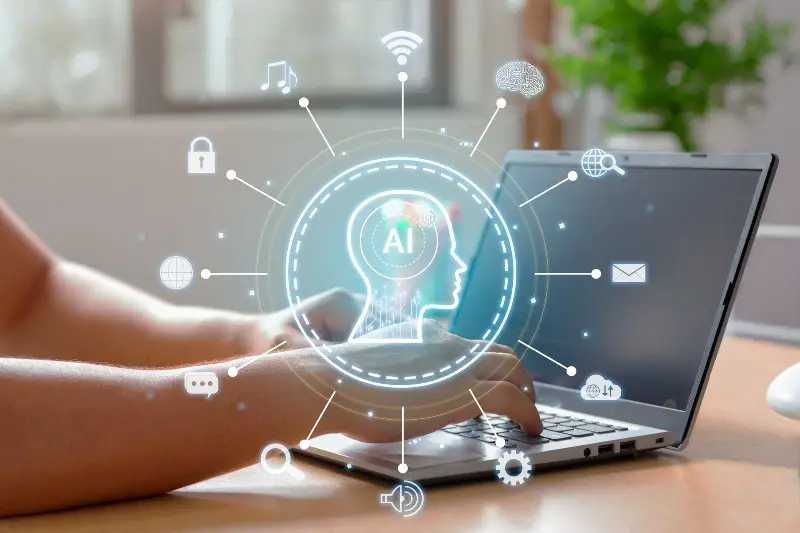In the rapidly evolving world of technology, “Black Box AI” emerges as a term shrouded in both fascination and mystery. It’s a concept that has sparked endless debates and discussions, particularly among tech enthusiasts, business leaders, and policymakers. This blog post aims to demystify the enigmatic world of Black Box AI, breaking down its complexities into simpler, more digestible bits of information. Our journey into this intriguing subject will be accessible to anyone, even those who have education up to the eighth-grade level.
We’ll explore various facets of Black Box AI, including its implications in finance, the role of developers and data scientists, and its impact on robotics and the future of work. By dissecting these topics, we aim to provide a clearer understanding of what Black Box AI truly entails and how it is shaping our world.
Finance and Black Box AI
The Financial Sector’s Leap into AI
In the realm of finance, Black Box AI represents a revolutionary leap. Financial institutions are increasingly turning to AI to make sense of vast amounts of data, from predicting market trends to automating trading strategies. This technology allows for rapid analysis of complex financial patterns, something that would take humans much longer to process. As a result, decisions are made faster, potentially leading to more profitable outcomes.
Risk and Reward
However, the use of Black Box AI in finance is not without its risks. The lack of transparency in how these AI systems make decisions can be a double-edged sword. On one hand, it can lead to impressive financial gains; on the other, it could result in unforeseen losses or ethical dilemmas, especially if the AI’s decision-making process isn’t fully understood by its users.
Developers and Data Scientists
The Architects Behind AI
Developers and data scientists are the architects behind the creation and refinement of Black Box AI. These professionals use their skills in programming, data analysis, and machine learning to build AI systems that can perform complex tasks. They play a crucial role in designing algorithms that can learn from data, making AI smarter and more efficient over time.
The Challenges They Face
Despite their expertise, developers and data scientists often face significant challenges with Black Box AI. The main issue is ensuring that the AI systems they create are both effective and ethical. This involves not just technical skills, but also a deep understanding of the societal implications of their creations. Balancing innovation with responsibility remains a key challenge in this field.
Robotics and Black Box AI
AI-Driven Robotics
In robotics, Black Box AI is changing the game by enabling robots to perform tasks with a level of autonomy and efficiency previously unattainable. These AI-driven robots can learn from their environment, adapt to new situations, and make decisions independently. This advancement is particularly beneficial in industries like manufacturing and healthcare, where precision and adaptability are crucial.
The Future of Human-Robot Interaction
The integration of Black Box AI in robotics also raises questions about the future of human-robot interaction. How will humans coexist with increasingly intelligent robots? The challenge lies in ensuring that these robots remain tools that enhance human capabilities, rather than becoming uncontrollable entities.
Myths vs. Facts about Black Box AI
Unraveling the Misconceptions
There are many myths surrounding Black Box AI, often stemming from a lack of understanding or fear of the unknown. One common myth is that Black Box AI is inherently dangerous and uncontrollable. In reality, while there are risks, these systems are created and managed by humans who establish guidelines and safety measures.
The Reality of AI
Another myth is that Black Box AI is infallible. The truth is, AI systems are only as good as the data they are trained on and the algorithms they use. They can make mistakes, and their decision-making process can be biased if the input data is flawed. It’s important to remember that Black Box AI, like any technology, has its limitations and requires careful oversight.
FAQ
Common Questions about Black Box AI
What is Black Box AI? Black Box AI refers to artificial intelligence systems whose decision-making processes are not transparent or easily understandable by humans. These systems can analyze and learn from data, making decisions or predictions without human intervention. However, exactly how they arrive at these decisions is often unclear, even to the developers who create them.
Why is it called ‘Black Box’? The term ‘Black Box’ is borrowed from aviation, where it refers to a device whose workings are obscure but vital. In AI, it signifies that the internal workings of the algorithm are not visible or understandable from the outside. This lack of transparency is a key characteristic of Black Box AI.
Is Black Box AI reliable? While Black Box AI can be incredibly powerful and accurate, its reliability depends on several factors, including the quality of the data it’s trained on and the robustness of the algorithms. It’s crucial to approach these AI systems with a degree of caution and continuous evaluation.
Can Black Box AI be made more transparent? Efforts are underway to make AI more transparent and understandable, such as developing explainable AI (XAI) models. These models aim to make the decision-making process of AI more accessible and comprehensible to humans, addressing the ‘black box’ nature of some AI systems.
How is Black Box AI shaping our future? Black Box AI is influencing many aspects of our lives, from the financial sector to healthcare, transportation, and beyond. Its ability to process vast amounts of data and make complex decisions quickly is driving innovation and efficiency. However, it also presents challenges related to ethics, privacy, and control, which society will need to address.
Google Snippets
Insights into Black Box AI and Related Fields
Black Box AI: A term used to describe AI systems whose internal decision-making process is not transparent or easily understood by humans. These systems are prevalent in various sectors, including finance, healthcare, and autonomous vehicles.
Machine Learning: A branch of AI that focuses on the development of algorithms that enable computers to learn and make decisions from data. It is a foundational technology for many Black Box AI systems.
Artificial Intelligence in Finance: Refers to the use of AI technologies, including Black Box AI, in the financial sector for tasks such as risk assessment, fraud detection, algorithmic trading, and customer service automation.
Black Box AI Meaning
Perspectives from Different Sources
Technical Definition: Black Box AI is an artificial intelligence system where the inputs and outputs are known, but the process by which the system reaches its conclusions is not fully understood or is too complex to be easily explained.
User-Centric View: From a user’s perspective, Black Box AI often appears as a sophisticated tool that provides solutions or predictions without offering an insight into how these conclusions were reached.
Ethical Consideration: In ethical discussions, Black Box AI is seen as a challenge, raising concerns about accountability, bias, and the need for transparency in AI systems, especially when used in critical decision-making processes.
Did You Know?
Intriguing Facts about Black Box AI
Historical Roots: The concept of ‘black box’ in science predates AI and was used in cybernetics and systems theory to describe complex systems whose internal workings are unknown or not important for the understanding of their behavior.
AI Art and Creativity: Some Black Box AI systems have been used in the field of art and creativity, generating music, paintings, and literature, often producing results that are indistinguishable from human-created works.
Impact on Medical Diagnosis: Black Box AI is making significant strides in medical diagnosis, analyzing medical imagery with high accuracy. However, the lack of transparency in decision-making sometimes poses challenges for doctors in interpreting the AI’s recommendations.
In summary, Black Box AI represents a fascinating and complex aspect of modern technology. Throughout this post, we have explored its role in various fields, debunked common myths, addressed frequently asked questions, and highlighted some intriguing facts. While Black Box AI offers immense potential for innovation and efficiency, it also raises critical questions about transparency, ethics, and the future of human-AI interaction. As we continue to advance in this field, it’s crucial to balance the pursuit of technological breakthroughs with a commitment to ethical and responsible development.
The journey into the world of Black Box AI is not just about understanding a technology; it’s about appreciating its impact on our lives and shaping its future in a way that benefits humanity. Whether in finance, robotics, or the work of developers and data scientists, Black Box AI is a testament to human ingenuity and a reminder of our responsibility to guide its evolution wisely.
References
- Thinkful offers insights on how to address the “black box” problem in AI through Explainable AI (XAI) and transparency models. They discuss techniques like Feature Importance Analysis, Local Interpretable Model-agnostic Explanations (LIME), SHapley Additive exPlanations (SHAP), Model Distillation, and Decision Rules, which are designed to make AI models more interpretable and transparent. This is especially important in applications where decisions can have far-reaching consequences, such as healthcare or finance
- Superb AI‘s blog discusses the challenges of the reliability of AI and its adoption into society, given the opaque nature of black box models. The widespread use of AI technologies presents issues related to data bias, lack of transparency, and potential infringement on human rights. The article addresses how Explainable AI is crucial for building AI systems that are not only powerful but also trustworthy and accountable.





